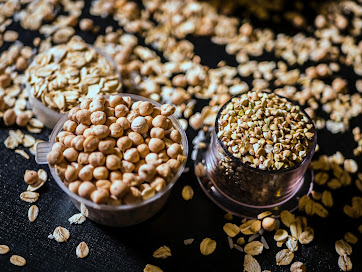How to lose Weight loss - Finding and maintaining a healthy weight is really all about living a healthy lifestyle. Here's some healthy-living advice to get you started.
The 15 ways to lose weight naturally
Start the day by drinking water
When people wake up, they are usually dehydrated, which the body interprets as hunger, causing them to overeat. As a result, drinking water first thing in the morning can help you feel less hungry.
Because water fills the stomach, drinking water before meals limit food intake. Drinking plenty of water and being hydrated is also beneficial to one's general health.
Eating a healthy and heavy breakfast
The most important meal of the day is breakfast. When compared to the rest of the meals, calories taken at breakfast are readily expended.
High-fiber diet
Including a high fiber diet in one's diet aids digestion and promotes early satiety (feeling of fullness). Fruits and vegetables are included in a high-fiber diet.
Eating whole grains
Brown rice, brown pasta, and brown bread are examples of whole grains. They are more nutrient-dense than their more processed cousins, and they aid in achieving early satiety, feeling fuller for longer periods of time, and reducing appetite...
Increase protein and decrease carbohydrates
Protein burns more calories than carbs or fat. Increased protein intake boosts metabolism, increases the number of calories burned, and helps to strengthen metabolism.
Napping instead of snacking
More than a sugar rush, a quick power nap of even 15 minutes can help energize and restore oneself. Taking a little nap or going for a brisk stroll while hungry will help to alleviate hunger pangs.
Adding good fats to the diet
Healthy fats are burned instead of being stored in the body. Salmon, avocados, and coconut oil are good fat foods that can help you lose weight.
Drinking coffee to fight hunger
Caffeine decreases hunger, according to studies. Caffeine provides a number of other advantages, including increasing energy and enhancing mood.
To prevent consuming too many calories, it is recommended that you consume black brewed coffee or coffee with fat-free milk.
Reducing sugar intake
Desserts, sodas, and commercial fruit drinks, which contain more sugar than fruit, should be avoided as much as possible to limit sugar intake.
Doing meditation or yoga
Cortisol, commonly known as corticosteroids or the "stress hormone," is elevated by chronic stress. This hormone causes weight growth. Stress can be lessened by taking 30-60 minutes of yoga, meditation, or outdoor exercises each day, which lowers cortisol levels and improves weight loss.
Being constantly active
It's not necessary to go to the gym to be active; it could simply entail moving around at work or at home, especially after meals, or performing a few squats on occasion.
Exercising
High-intensity workouts, swimming, running, and lifting weights are all examples of exercise (lifting weights builds muscle and burns fat).
To see benefits, it's critical to stick to a fitness routine and be consistent.
Stepping on the scale
Regularly weighing oneself may be discouraging at first, but it is the best method to stay motivated and track one's weight reduction progress.
Setting goals
Setting objectives is crucial for staying motivated and adhering to a diet and fitness routine.
Setting goals can be done in a variety of ways, including setting phone reminders, posting posters, keeping a journal, or purchasing an outfit that you wish to fit into by a specific date or for a specific occasion.
Putting together a group of friends with common interests
Finding a network of people who share similar interests can help you stay motivated and reach your goals more quickly, while also making the process more fun.








